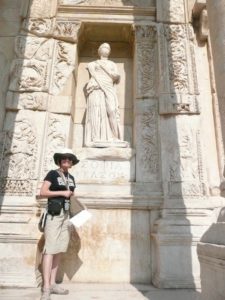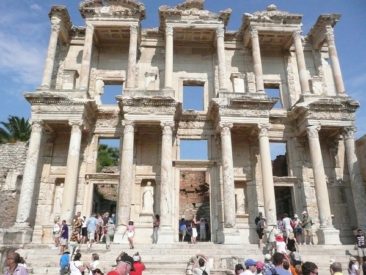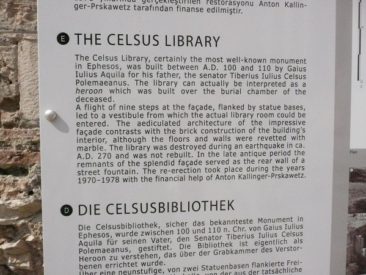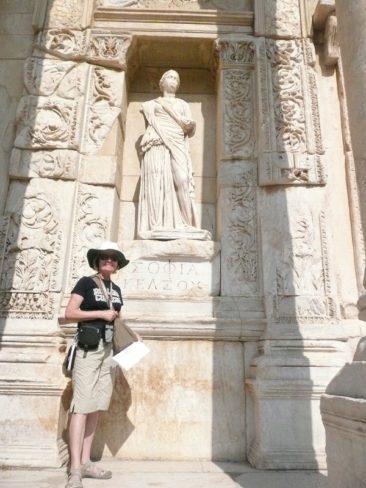
Greetings! How do we love our libraries? Let us count the ways: in libraries we can exercise our freedom to read, expand our understanding of the world, enjoy a community of folks who value literature. When was the last time you browsed aisles of your public library and discovered a gem of a book that enlightened you? I recently read one such book I can’t stop thinking about.
The Library Book
This is it: The Library Book. That’s the actual title. It’s a non-fiction story by Susan Orlean, and it demonstrates her love of public libraries as she delivers a well-researched, fascinating story-behind-the story of the terrible fire that nearly destroyed, in 1986, the artful Los Angeles Public Library.
Orlean’s name may be familiar—she’s the author of The Orchid Thief, which was made into a movie. I love Orlean’s work. A few years ago, I had the joy of attending a master writing class she conducted at Rollins College. What I loved about that class was her emphasis on the need for writers (of novels, stories, journalistic reports, any sorts of articles) to create a strong lede or “hook” at the start. Grab your reader’s attention. The lede should intrigue them, make them say, “Huh? Tell me more.” Orlean is a master at that. Here’s the first sentence from The Library Book:
“Even in Los Angeles, where there is no shortage of remarkable hairdos, Harry Peak attracted attention.”
My hometown library
When I was a kid, my mother worked awhile in our town’s library: The Wicomico County Public Library. Sometimes after school, I’d walk downtown to visit her there. The library was about a ten-minute trek from St. Frances de Sales Catholic School where Sisters of Mercy taught me for eight years. I’d find Mom either behind the check-out counter or shelving books back in the stacks. She wasn’t a professional librarian, but there’s no doubt she was a dedicated staff worker who loved reading and cared about books.
Somewhere in my DNA is that same love. It’s blossomed especially now that I’m no longer encased in the confining ideology of a cult that did not encourage reading much of anything besides the Bible and books written by the cult leader and his employees. Maybe because of that experience, I now appreciate, much more than when I was a kid, the freedom to read whatever I want, and libraries that help me do that.
In my current hometown library, Winter Park Library, I not only enjoy checking out books but am very grateful to have had the chance to conduct events promoting my own books: Undertow and From the Porch to the Page.
A faraway library
In 2001, my husband and I travelled for nearly a month around Turkey, visiting many sites, including some along the sparkling Mediterranean shore. A most memorable stop along the beach is the ancient town of Ephesus. I was awestruck by the ruins at Ephesus: the large amphitheater, the row of market stalls, and especially the Celsus Library, the third largest library in the ancient world.
From my years in a Bible-based cult (The Way International) I was long familiar with Ephesus. If you’ve read the Apostle Paul’s letter (in the New Testament of the Bible) to the Ephesians, you know it focuses on what he wanted them to believe about Christ, not much else, certainly not any challenging and conflicting ideas they might encounter at their local library to help them think critically. By their very nature, libraries’ have always threatened restrictive ideologies. Of course, there were many folks back then, I imagine, who didn’t know how to read, but they could always ask someone who did to read from those well-stored manuscripts.
Anyway … here’s a bit about the library at Ephesus (from the website here.)
“The main reading area was located on a large single floor with high ceilings. The upper floors circled the reading area and housed the scrolls which would have been kept in cupboards in niches on the walls. The hand-written books were brought to the reading area by officials and handed to readers for use the main reading room only.
The library burned in the 3rd century AD and was restored in the 4th century AD. It was destroyed by an earthquake in the 10th century AD. The library has been restored with the aid of the Austrian Archaeological Institute. Statues said to be the virtues of Celsus were found in the library and taken to Ephesus Museum in Vienna. Replicas of the statues symbolizing wisdom (Sophia), knowledge (Episteme), intelligence (Ennoia) and valor (Arete) can be seen in niches on the walls today.”
See my photos below.
My Turkey travel blog
To read about our adventures all over Turkey in 2001, click here.
Long live the library!
Thanks for reading.
Your writer on the wing,
Charlene










Rob Ruff
Thought provoking piece, Charlene. “Restrictive ideologies” of course threaten unfettered participation in government as well as the freedom to read. Never until the spread of MAGA did I fear that democracy as we know it would be threatened in this nation. Madison and the other Founding Fathers thought, or at least hoped, that their efforts would keep threats like Trump in check.
Charlene L. Edge
Thanks for this, Rob. I hear you. Could not agree more.
Kathleen Brandt
Timely piece! And I love the pictures. Thanks, Charlene.
Charlene Edge
Timely is right, especially here in Florida where school libraries are under duress from a minority of censorship-seeking parents who want to control what everyone else’s kids can find and read in their school libraries. They forget something: public libraries are available to kids, too, and when you forbid the reading of a book, people line up to find it and read it anyway!